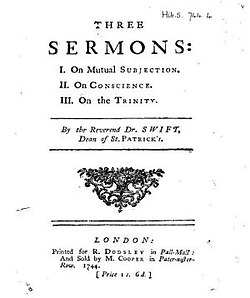
Jonathan Swift, as Dean of St. Patrick's Cathedral in Dublin, produced many sermons during his tenure from 1713 to 1745.[1] Although Swift is better known today for his secular writings such as Gulliver's Travels, A Tale of a Tub or the Drapier's Letters, Swift was known in Dublin for his sermons that were delivered every fifth Sunday. Of these sermons, Swift wrote down 35, of which 12 have been preserved.[2] In his sermons Swift attempted to impart traditional Church of Ireland values to his listeners in a plain manner.[2]
Of the surviving twelve sermons, four have received serious consideration: "Doing Good", "False Witness", "Mutual Subjection" and "Testimony of Conscience".[3] These sermons deal with political matters and are used to give insight to Swift's political writing; the sermon "Doing Good" and its relationship with the Drapier's Letters is one such example. However, the audience at St. Patrick's Cathedral did not come to hear connections to political works, but to enjoy the well-known preacher and be "moved by his manners".[4]
Each sermon begins with a scriptural passage that reinforces the ideas that will be discussed in the sermon and each was preceded with the same opening prayer (which Swift also delivered).[2] The sermons are plainly written and apply a common-sense approach to contemporary moral issues in Dublin.[2] Swift patterned his sermons on the plain style of the Book of Common Prayer and the Church of Ireland Authorized Version of the Bible.[5][6]
